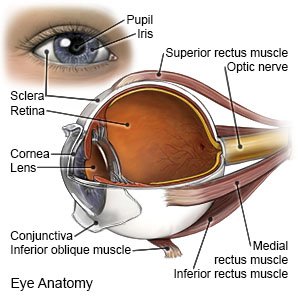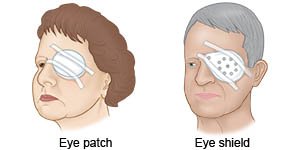Photorefractive Keratectomy
Medically reviewed by Drugs.com. Last updated on Aug 4, 2025.
Photorefractive keratectomy (PRK) is laser surgery to correct refractive errors of the eye. Refractive errors are common eye disorders that cause blurred vision. These errors happen when there is a problem in the refraction (bending) of light in the eye. They are often caused by an abnormal shape and texture of the cornea. The cornea is the clear outer layer of your eye. PRK uses a laser to reshape your cornea or make it smoother. This helps light to focus better in the eye, which leads to clearer vision.
 |
DISCHARGE INSTRUCTIONS:
Seek care immediately if:
- You feel sudden, sharp eye pain.
- You suddenly lose your vision.
- Your eye problems, such as blurred vision, become worse.
Contact your eye specialist if:
- You accidently rub or touch your eye.
- You see flashing lights.
- Your eyes are red or drain pus.
- You have any questions or concerns about your surgery, condition, or care.
Medicines:
It is very important that you use the following eyedrops as directed. You may need to continue using them daily for up to 4 months.
- Antibiotic eyedrops help prevent an infection caused by bacteria.
- Steroid eyedrops help decrease eye inflammation.
- Take your medicine as directed. Contact your healthcare provider if you think your medicine is not helping or if you have side effects. Tell your provider if you are allergic to any medicine. Keep a list of the medicines, vitamins, and herbs you take. Include the amounts, and when and why you take them. Bring the list or the pill bottles to follow-up visits. Carry your medicine list with you in case of an emergency.
Follow up with your eye specialist as directed:
You will need to return to have your eyes checked and the soft bandage contact lens removed. Write down your questions so you remember to ask them during your visits.
Eye care:
- Do not rub your eyes for at least 3 months. Rubbing your eyes can move or damage the flaps.
- Rest your eyes. Use your eye shield, eye patch, or corrective lenses as directed. Get plenty of sleep. Limit activities that strain your eyes, such as reading.

- Use lubricating eyedrops as directed. You will need to use drops that do not contain preservatives at first. Your eye specialist will tell you how long to use preservative-free drops. Talk to your provider if dry eye continues for longer than the first week after surgery.
- Ask about activity. You may need to avoid exercise and contact sports. Do not swim, sit in a hot tub, fly, or scuba dive until your healthcare provider says it is okay. These activities increase the pressure in your eyes. Ask when you can start to wear makeup.
- Use proper lighting. This will help you see more clearly. Use lights that decrease glare in your home or workplace.
- Wear sunglasses outside. This will help protect your eyes and decrease sensitivity to light.
Follow up with your doctor as directed:
Write down your questions so you remember to ask them during your visits.
© Copyright Merative 2025 Information is for End User's use only and may not be sold, redistributed or otherwise used for commercial purposes.
The above information is an educational aid only. It is not intended as medical advice for individual conditions or treatments. Talk to your doctor, nurse or pharmacist before following any medical regimen to see if it is safe and effective for you.
Further information
Always consult your healthcare provider to ensure the information displayed on this page applies to your personal circumstances.
